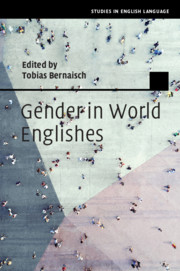Book contents
- Gender in World Englishes
- Studies in English Language
- Gender in World Englishes
- Copyright page
- Dedication
- Contents
- Figures
- Tables
- Contributors
- Chapter 1 Introduction
- Chapter 2 Localisation, Globalisation and Gender in Discourse-Pragmatic Variation in Ghanaian English
- Chapter 3 Sociolinguistic Variation in Intensifier Usage in Indian and British English
- Chapter 4 Tag Questions and Gender in Indian English
- Chapter 5 Hedges and Gender in the Inner and Expanding Circle
- Chapter 6 The Role of Gender in Postcolonial Syntactic Choice-Making
- Chapter 7 Social Constraints on Syntactic Variation
- Chapter 8 Linguistic Colloquialisation, Democratisation and Gender in Asian Englishes
- Chapter 9 Gender, Writing and Editing in South African Englishes
- Index
- References
Chapter 8 - Linguistic Colloquialisation, Democratisation and Gender in Asian Englishes
Published online by Cambridge University Press: 11 December 2020
- Gender in World Englishes
- Studies in English Language
- Gender in World Englishes
- Copyright page
- Dedication
- Contents
- Figures
- Tables
- Contributors
- Chapter 1 Introduction
- Chapter 2 Localisation, Globalisation and Gender in Discourse-Pragmatic Variation in Ghanaian English
- Chapter 3 Sociolinguistic Variation in Intensifier Usage in Indian and British English
- Chapter 4 Tag Questions and Gender in Indian English
- Chapter 5 Hedges and Gender in the Inner and Expanding Circle
- Chapter 6 The Role of Gender in Postcolonial Syntactic Choice-Making
- Chapter 7 Social Constraints on Syntactic Variation
- Chapter 8 Linguistic Colloquialisation, Democratisation and Gender in Asian Englishes
- Chapter 9 Gender, Writing and Editing in South African Englishes
- Index
- References
Summary
Linguistic colloquialisation and democratisation are said to be responsible for some of the recent changes in inner-circle varieties of English. Thus, colloquialisation is said to be the process that explains changes such as an increase in the use of the future marker be going to, an increase in the frequency of not negation to the detriment of no negation, and an increase in the use of contractions, among others. Democratisation is claimed to be at the root of an increasing use of non-sexist language, including the use of neutral professional terms (e.g. fire-fighter instead of fireman), the use of gender-neutral or inclusive third-person singular pronouns (singular they, or coordinate he or she, rather than generic he), a decline in the use of deontic modal must and a parallel increase of the semi-modals have to and need to. This paper explores these six markers in two Asian Englishes spoken in India and Hong Kong from a genderlectal perspective using ICE-India and ICE-Hong Kong. The results show that (i) colloquialisation and democratisation are global tendencies; (ii) that Hong Kong English is closer to Inner-Circle varieties of English than Indian English regarding these two phenomena; and (iii) that Indian women are clear leaders of the six changes related to colloquialisation and democratisation.
Keywords
- Type
- Chapter
- Information
- Gender in World Englishes , pp. 176 - 204Publisher: Cambridge University PressPrint publication year: 2021

